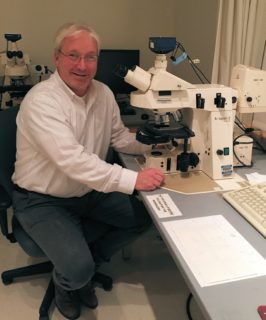Chair of the Department of Comparative Medicine at Yale University and research professor of the Anatomy Department at the University of Veterinary Sciences in Budapest, Professor Tamás Horváth was born in Nagykőrös, Hungary in 1967. His Italian wife is a research biologist working for Yale University as well. They have four children. His research area is focused on the role of the nervous system in endocrine regulation and the neural effects of peripheral organs. His pioneering research was instrumental in exploring the hypothalamic nuclear groups playing a key role in nutrition, metabolic rates and the regulation of obesity. Here’s an extract of our interview with him.
– Professor, do you get hungry? The reason I’m asking is because, as far as I know, some of your research may suggest that humanity actually benefits from hunger.
– Of course, just like most people, I tend to get hungry, too. Let me note that I very much enjoy being hungry. First, it urges me to do my work or collect new information more efficiently and, last but not least, it’s an excellent basis for you to enjoy a good meal.
– How can you define hunger? Are there any measurement units for hunger? Is there a way to measure it?
– The extent of hunger may primarily be identified in the circulation, by measuring various hormones and metabolites. These changes trigger the subjective hunger sensation, which is then “translated” by the hypothalamic cells into neural information, which is eventually “consciously registered” in the pallium.
– Throughout your higher education studies, the desire for discovery was always your primary motivation. Where does this passion come from?

– The passion for discovery and innovation captured me through such books as the Seventy-Seven Hungarian Folk Tales, Robinson Crusoe and The Double Helix (story of the discovery of DNA). In retrospect, I admit that my interest in research may have been influenced by the fact that I hated going to kindergarten and school, partly because my head was not designed to memorize things and I didn’t like ties, either. Research, i.e., the discovery of new things is the polar opposite of colloquial studies: there’s no recipe and nobody knows which is the right path. Basically, you don’t need to follow lexical information. In fact, its rejection may lead you to many new discoveries.
– You’ve been working in the US for a quarter of a century. When did you first think of the New World as a potential workplace? What synergies can your research help to develop between Yale and the University of Veterinary Sciences?
– I’ve been interested in the US ever since my young years. I was 17 when I first seriously considered the idea during a holiday at Lake Balaton. I was reading a Hungarian book on US agriculture and it felt like I was reading a Márai novel.
I chair the Department of Comparative Medicine at Yale. Thirteen years ago (when I took over the management of the institution), it was ranked as the lowest in the country. Today it’s the only department within Yale’s medical school to be ranked the highest in the US. We are convinced that the philosophy connecting veterinary and human medical science (comparative medicine) will have an extraordinary impact on the progress of medical science. Combining the professional depth of Budapest University of Veterinary Science with the outstanding scientific capabilities of Yale School of Medicine allows us to create such synergies that may lead to major new discoveries.
– As the thematic supervisor of the Veterinary Science Doctoral School, you set the comprehensive goal for us to understand the benefits, biological basis and physiological role of reduced calorie intake (calorie restriction).
Since most advanced societies are characterized by an ageing population, your work will directly affect international healthcare. What results can you expect from your research in this regard?
– Due to the factors I mentioned, what we are primarily interested in is the potential correlation between the extent of hunger (and not satisfying it) and healthy life expectancy. The goal is not simply to live longer but to stay healthy as long as possible. We expect and hypothesize that the brain areas responsible for hunger greatly impact our health and therefore our life expectancy as well.
Interview by Gusztáv, Balázs – UNIVET Magazine, 2019 June
